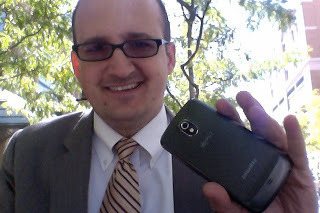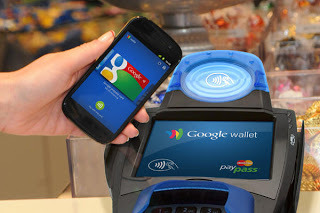Jesse Stay's Blog, page 17
October 1, 2012
Android is Finally "Enough", but I Still Miss My iPhone

I've written a few times on this blog about my trials with Android and dissatisfaction with devices under Google's operating system. The fact is, lack of consistent experience because Google doesn't own the experience, means they will likely never have a leg-up on the experience iOS gives users, considering Apple controls and owns the entire experience in their OS. Google proved me only partly wrong in this though, with their latest release of Jellybean and the Galaxy Nexus, yet I still find myself missing my iPhone. I'll explain.
At Google's recent developer conference at Google I/O I was given a Galaxy Nexus to try and play with as my device. I've been using this as my primary device since around May, and for the first time ever, I find myself actually enjoying the Android experience. The voice controls are solid. I love the animated background and the new widget layouts. Google Play predicts my travel and tells me how long it takes to get to where I'm going, when I'm going, without me ever needing to ask. Gmail is seamless and provides an experience that I just can't get on iOS. Google Calendar and other Google products work seamlessly. The battery actually lasts this time.
Yet I still find myself missing my iPhone. The thing is, it doesn't matter how many cool features and integrated components Google adds to the Android experience. Because Google doesn't own the phone - even on their stock experiences such as the Galaxy Nexus - they can't control the full experience of the user. On my Galaxy Nexus, which is supposed to be the stock Google experience, I find the camera to be sub-par. It takes about 5 extra steps just to make a phone call. The phone gets triggered on every time I put it in my pocket, occasionally pocket-dialing people.
Then there are the apps. Google doesn't monitor their Google Play app store like Apple does with theirs. Google doesn't provide stock controls like sliders, scroll buttons, etc. to developers like Apple does, so app experiences aren't consistent. As a result, I'm finding apps to be much more buggy than their Apple counterparts. I find apps crash a lot more in Android than they do iOS. In some cases the apps are available for other Android phones, but not my Galaxy Nexus. On Apple, almost always, apps are always available for every Apple iOS device. Until Google controls both the hardware and app store experiences, they simply won't be able to compete with the experience Apple provides.
I think that's okay to Google though. Google will always have the masses, very similar to the approach Microsoft took in the Desktop market (until Microsoft figures out the mobile market and competes with Google). They will always be sub-par to Apple I'm afraid, unless they can solve the problems I mention above.
Do I love Android? I still do! It's a beautiful OS. It does some things much better than iOS. For an overall experience that will save me the most time though, I'm still looking forward to my iPhone 5 shipping tomorrow, and I will likely use it as my primary phone moving forward. If this ever changes you can bet I'll be the first to write about it and tell you right here. As a lover of technology, it's great to see the competition! I just hope Google can take this as feedback.
What do you think?
Originally posted on Google+!






Published on October 01, 2012 12:55
September 18, 2012
Ancestry.com Buys Top Facebook App We're Related

In the early days of Facebook's developer platform (2007, to be exact), as apps were going from 0 to 2 or more million users in just a matter of days, family history apps were among the first to rise to the top. The link between family connections and friend connections seemed like a natural fit for apps that were built to connect one another. It appears that, according to Ancestry Insider, one of the pioneer Facebook apps in this industry, We're Related, was just acquired by Ancestry.com for an undisclosed amount (both are Utah-based companies where I am located).
We're Related quickly went to the top of the Facebook app store as number 1 where it sat as the top-used app by users worldwide on the Facebook Platform. The app, founded by Paul Allen (ironically the founder of Ancestry.com), intended to show how Facebook friends were related through their family history. The app allowed users to enter their family information, and would then notify family members that they had been added to one's family tree, asking them to confirm the addition. This "peer-pressure" amongst family members no-doubt led to the app's popularity on Facebook.
The app was soon expanded to the site, FamilyLink.com which built a standalone site around connecting families through their social networking connections. Shortly after Facebook started imposing restrictions on how app developers could advertise, the app started losing money and FamilyLink had to pivot to more of a site-based model.
According to Ancestry Insider, FamilyLink was sold recently to MyHeritage.com, but the assets of the We're Related Facebook app were retained by Paul Allen. It would appear that some time before July, Paul Allen sold the final assets of the We're Related app to Ancestry.com for somewhere under $11.7 million. According to the SEC Form 10-Q filed by Ancestry.com, "In March 2012, the company completed two acquisitions for a total of approximately $11.7 million in cash consideration. The company acquired the DNA assets of Sorenson Molecular Genealogy Foundation, a non-profit organization with a diverse collection of DNA samples and corresponding genealogical information. The company also acquired We’re Related, LLC, which operates the We’re Related Facebook application." It is unclear how much of that $11.7 million went to We're Related.
Ancestry Insider also notes that Ancestry.com also has started their own Facebook app, which operates somewhat similar to the We're Related app on top of Ancestry.com data. It's unclear as to whether Ancestry.com has used the assets of We're Related to create their own app.
This acquisition marks the end of a golden era of Facebook app development. This was an era where apps could integrate with every element of the Facebook.com experience, advertise as they wanted, and see incredible results as a result. The playing field has since shifted to a much cleaner approach by Facebook of focusing on the News Feed, while encouraging developers to integrate Facebook Platform outside of the Facebook environment. These apps were truly the pioneers in this era, and deserve all the credit they can get.
Disclosure: We're Related was one of my first clients when I went out on my own as an entrepreneur. I helped them with some initial wireframes of the app, and later on with some help in publicity for their app. This app is near and dear to my heart.






Published on September 18, 2012 00:10
August 11, 2012
Can't get Google Wallet to Work? Have an Expanded Battery Pack? That may be Your Problem.

I've been beating my head around why every place I've gone to so far with Paypass (Home Depot, McDonalds, Best Buy, 7-Eleven, you name it) hasn't worked with my new Galaxy Nexus phone that's supposed to work with NFC and Google Wallet. I searched all the forums and just couldn't figure out what was happening. The guys at 7-Eleven said it worked with every other phone they tried it with.
Then I remembered - I had an extended battery pack that I bought off Amazon that was on the phone to extend the battery life. It made the back of the phone a lot bigger, I'm guessing preventing the NFC signal from getting through. I actually found a unique way of testing it: The Nexus Q actually supports NFC. If you hold your phone up to the Nexus Q your phone will open up to the Nexus Q app in the Play Store. So I ran an experiment.
Just as with 7-Eleven and all the other Paypass stores, the Nexus Q didn't register when I'd hold up my phone to the Nexus Q. When I removed the extended battery pack, sure enough, the phone would buzz, beep, and then open up to the Nexus Q app. That was indeed my problem!
So if you're experiencing this same issue, try putting back in the original battery. I'm betting this fixes a few issues, and it's odd that I'm not seeing this warning anywhere in the Galaxy Nexus forums or docs. I'm surely not the only one with a battery pack! And how does it work with thicker cases?
If this helped you, let me know in the comments!
Shared first on Google+!
UPDATE: I'm being told on Google+ that the NFC is actually in the battery on the Galaxy Nexus, so that would explain why this happens. I wonder if there are expanded battery packs that have NFC in them so this doesn't happen. If you know any let me know in the comments!






Published on August 11, 2012 18:05



